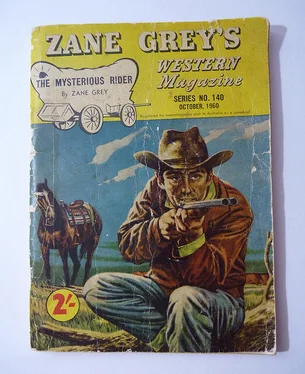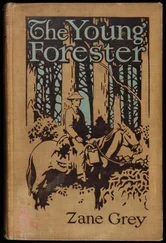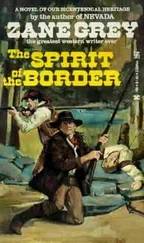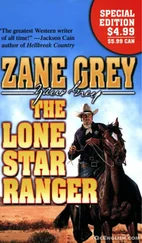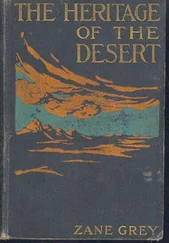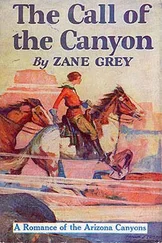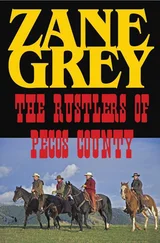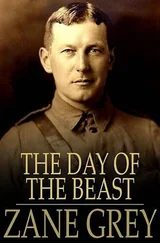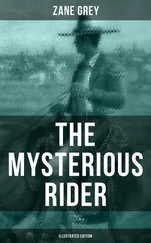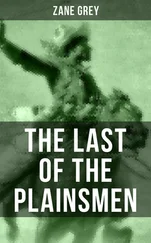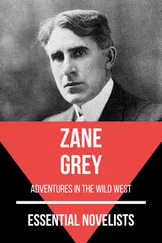Moore did not return to meet her. His white horse grazed in the pasture opposite the first clump of willows, where Sage Valley merged into the larger valley. Then she saw other horses, among them Lem Billings's bay mustang. Columbine faltered on, when suddenly she recognized the horse Jack had ridden—a sorrel, spent and foam-covered, standing saddled, with bridle down and riderless—then certainty of something awful clamped her with horror. Men's husky voices reached her throbbing ears. Some one was running. Footsteps thudded and died away. Then she saw Lem Billings come out of the willows, look her way, and hurry toward her. His awkward, cowboy gait seemed too slow for his earnestness. Columbine felt the piercing gaze of his eyes as her own became dim.
“Miss Collie, thar's been—turrible fight!” he panted.
“Oh, Lem!... I know. It was Ben—and Jack,” she cried.
“Shore. Your hunch's correct. An' it couldn't be no wuss!”
Columbine tried to see his face, the meaning that must have accompanied his hoarse voice; but she seemed going blind.
“Then—then—” she whispered, reaching out for Lem.
“Hyar, Miss Collie,” he said, in great concern, as he took kind and gentle hold of her. “Reckon you'd better wait. Let me take you home.”
“Yes. But tell—tell me first,” she cried, frantically. She could not bear suspense, and she felt her senses slipping away from her.
“My Gawd! who'd ever have thought such hell would come to White Slides!” exclaimed Lem, with strong emotion. “Miss Collie, I'm powerful sorry fer you. But mebbe it's best so.... They're both dead!... Wade just died with his head on Wils's lap. But Jack never knowed what hit him. He was shot plumb center—both his eyes shot out!... Wade was shot low down.... Montana an' me agreed thet Jack throwed his gun first an' Wade killed him after bein' mortal shot himself.”
* * * * *
Late that afternoon, as Columbine lay upon her bed, the strange stillness of the house was disturbed by a heavy tread. It passed out of the living-room and came down the porch toward her door. Then followed a knock.
“Dad!” she called, swiftly rising.
Belllounds entered, leaving the door ajar. The sunlight streamed in.
“Wal, Collie, I see you're bracin' up,” he said.
“Oh yes, dad, I'm—I'm all right,” she replied, eager to help or comfort him.
The old rancher seemed different from the man of the past months. The pallor of a great shock, the havoc of spent passion, the agony of terrible hours, showed in his face. But Old Bill Belllounds had come into his own again—back to the calm, iron pioneer who had lived all events, over whom storm of years had broken, whose great spirit had accepted this crowning catastrophe as it had all the others, who saw his own life clearly, now that its bitterest lesson was told.
“Are you strong enough to bear another shock, my lass, an' bear it now—so to make an end—so to-morrer we can begin anew?” he asked, with the voice she had not heard for many a day. It was the voice that told of consideration for her.
“Yes, dad,” she replied, going to him.
“Wal, come with me. I want you to see Wade.”
He led her out upon the porch, and thence into the living-room, and from there into the room where lay the two dead men, one on each side. Blankets covered the prone, quiet forms.
Columbine had meant to beg to see Wade once before he was laid away forever. She dreaded the ordeal, yet strangely longed for it. And here she was self-contained, ready for some nameless shock and uplift, which she divined was coming as she had divined the change in Belllounds.
Then he stripped back the blanket, disclosing Wade's face. Columbine thrilled to the core of her heart. Death was there, white and cold and merciless, but as it had released the tragic soul, the instant of deliverance had been stamped on the rugged, cadaverous visage, by a beautiful light; not of peace, nor of joy, nor of grief, but of hope! Hope had been the last emotion of Hell-Bent Wade.
“Collie, listen,” said the old rancher, in deep and trembling tones. “When a man's dead, what he's been comes to us with startlin' truth. Wade was the whitest man I ever knew. He had a queer idee—a twist in his mind—an' it was thet his steps were bent toward hell. He imagined thet everywhere he traveled there he fetched hell. But he was wrong. His own trouble led him to the trouble of others. He saw through life. An' he was as big in his hope fer the good as he was terrible in his dealin' with the bad. I never saw his like.... He loved you, Collie, better than you ever knew. Better than Jack, or Wils, or me! You know what the Bible says about him who gives his life fer his friend. Wal, Wade was my friend, an' Jack's, only we never could see!... An' he was Wils's friend. An' to you he must have been more than words can tell.... We all know what child's play it would have been fer Wade to kill Jack without bein' hurt himself. But he wouldn't do it. So he spared me an' Jack, an' I reckon himself. Somehow he made Jack fight an' die like a man. God only knows how he did that. But it saved me from—from hell—an' you an' Wils from misery.... Wade could have taken you from me an' Jack. He had only to tell you his secret, an' he wouldn't. He saw how you loved me, as if you were my real child.... But. Collie, lass, it was he who was your father!”
With bursting heart Columbine fell upon her knees beside that cold, still form.
Belllounds softly left the room and closed the door behind him.
CHAPTER XX
Nature was prodigal with her colors that autumn. The frosts came late, so that the leaves did not gradually change their green. One day, as if by magic, there was gold among the green, and in another there was purple and red. Then the hilltops blazed with their crowns of aspen groves; and the slopes of sage shone mellow gray in the sunlight; and the vines on the stone fences straggled away in lines of bronze; and the patches of ferns under the cliffs faded fast; and the great rock slides and black-timbered reaches stood out in their somber shades.
Columbines bloomed in all the dells among the spruces, beautiful stalks with heavy blossoms, the sweetest and palest of blue-white flowers. Motionless they lifted their faces to the light. Out in the aspen groves, where the grass was turning gold, the columbines blew gracefully in the wind, nodding and swaying. The most exquisite and finest of these columbines hid in the shaded nooks, star-sweet in the silent gloom of the woods.
Wade's last few whispered words to Moore had been interpreted that the hunter desired to be buried among the columbines in the aspen grove on the slope above Sage Valley. Here, then, had been made his grave.
* * * * *
One day Belllounds sent Columbine to fetch Moore down to White Slides. It was a warm, Indian-summer afternoon, and the old rancher sat out on the porch in his shirt-sleeves. His hair was white now, but no other change was visible in him. No restraint attended his greeting to the cowboy.
“Wils, I reckon I'd be glad if you'd take your old job as foreman of White Slides,” he said.
“Are you asking me?” queried Moore, eagerly.
“Wal, I reckon so.”
“Yes, I'll come,” replied the cowboy.
“What'll your dad say?”
“I don't know. That worries me. He's coming to visit me. I heard from him again lately, and he means to take stage for Kremmling soon.”
“Wal, that's fine. I'll be glad to see him.... Wils, you're goin' to be a big cattleman before you know it. Hey, Collie?”
“If you say so, dad, it'll come true,” replied Columbine, with her hand on his shoulder.
“Wils, you'll be runnin' White Slides Ranch before long, unless Collie runs you. Haw! Haw!”
Collie could not reply to this startling announcement from the old rancher, and Moore appeared distressed with embarrassment.
Читать дальше
